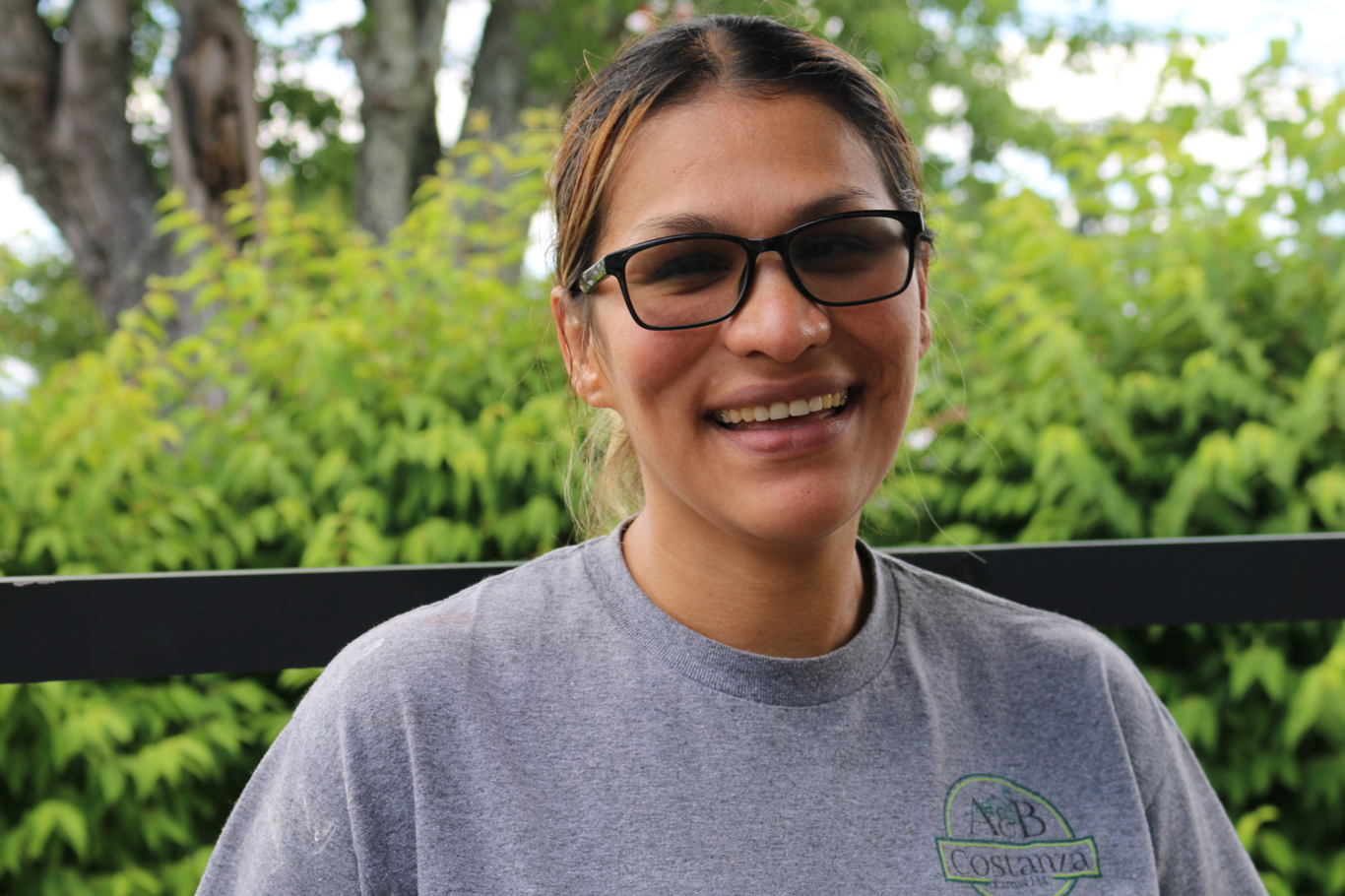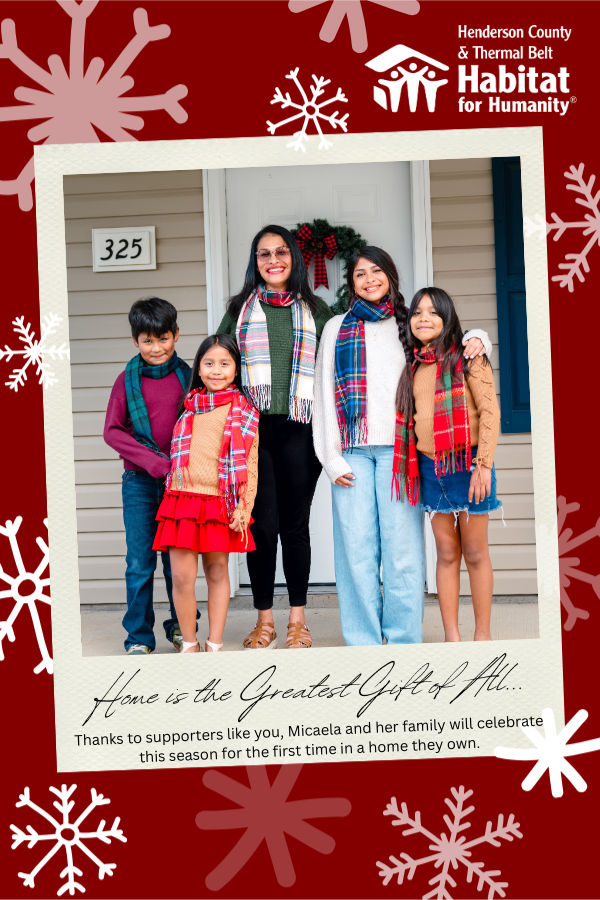She was born, part Mexican and part Native American, into the migrant farm worker community. Her parents were migrant workers, their parents were migrant workers, and their parents before them. “I’m trying to break that cycle for my kids,” she says. “As a migrant worker, I didn’t grow up in just one place. I always wanted a home growing up.”
Micaela remembers when Upward Elementary School was built. It opened in the early 90s, just as she approached school age. Micaela found herself in Henderson County at the start of every school year, right at the peak of apple season. Some days, Micaela and her siblings would dart across the road to attend class at Upward. On other days, they may not attend school at all, instead working in the fields beginning at dawn.
As a result, Micaela attended one semester of high school, then dropped out altogether. By the time the family returned to Florida in October each year, she was already too far behind her peers. Micaela also experienced physical abuse at the hands of her stepfather which impacted her childhood in countless ways. On top of this, Micaela was involved in a serious car accident at age 13. She was in a coma for several weeks and received multiple blood transfusions. As a result of the accident, she permanently lost vision in her left eye.
At 16, Micaela married while working in Georgia. Although still a teenager, for Micaela, marriage seemed to be an opportunity for less responsibility and more freedom. She was already working full time, and she also had a lot of extra duties, like cooking meals, in the migrant camps. She already felt grown up, so she didn’t hesitate to make it official on paper. She had five kids by age 28.
Up until about two years ago, Micaela was still working on farms, primarily between Michigan and North Carolina. Aside from the fact that it was all she’s ever known, one of the main reasons she continued in the industry was because of the housing that’s offered onsite. She describes it as a commune-style set up, where multiple families reside under one roof, and buildings are arranged in a grouping. The workers live together like family, sharing meals and laundry, and their kids all play together in the evenings. During the off season, Micaela and four of her kids would share one bedroom in her mom’s mobile home here in Hendersonville. Her oldest daughter, now a teenager,lives a few hours away, with her father. For years, Micaela traveled between Michigan and North Carolina with four young kids. She worked her way up into a supervisory role within the migrant farm work network.
Micaela is quick to point out that the industry has undergone reform since her childhood. Regulations are now in place to prevent young children from laboring in the fields, and living conditions have improved substantially. “When I was a kid, we starved,” she remembers. “Some nights we slept under a tree by the orchards.”
“Everything I’m doing now is to create a future for my kids.”
Another core memory from her childhood is getting up in the middle of the night and having to leave the place they were staying at the drop of a hat. They wouldn’t pack any of their belongings or clothing, and they’d move to the next farm and start from scratch. “Every time we left a place, I left a little piece of me behind,” Micaela says.The turbulence of it all has stuck with her.“I’m breaking all the cycles,” she asserts. “Everything I’m doing now is to create a future for my kids.”
In 2013, Micaela earned her GED through Michigan State University. Her mother cared for her children while she completed the course, which required her to live on campus. The program typically takes about three months to complete, but Micaela finished it in just over a month. “I did one subject every week, and I passed the exam every week,” she explains. “My dream was to wear a cap and gown.”
Not only did Micaela get to see herself in a cap and gown, she also earned an award from the National Association of State Directors of Migrant Education, and they flew her to Orlando to receive it during their annual conference. “My mom was so proud,” Micaela says, noting that both she and her mother have also walked through breast cancer diagnoses due to the BRCA1 gene.
Micaela never knew her father growing up. Only a few years ago, she found him through social media. They exchanged a few conversations and began making plans to meet, but he’d been deported to Mexico, and the flights were expensive. Tragically, he was shot and killed before they had a chance to arrange the visit.
“My faith in God has carried me through the experiences I’ve had in life,” she says. “I believe that things happen for a reason.”
Now, Micaela dreams of taking college courses in horticulture. She loves to be outside and to work with plants. No longer chasing the crops across the southeast, she currently works at a hydroponic greenhouse that packages salad greens and sprouts for grocery stores.With stable income, she was able to rent a three bedroom mobile home, but as a single mom making minimum wage, she doesn’t have the resources to take any additional steps forward.
“More than anything, I want my kids to be warm in the winter,” she says. “The trailer gets so cold.”The family loves watching movies together, and going to the park during the summer. During the school year, her kids are involved in soccer, and her middle schooler in track and orchestra. In her down time, Micaela loves to read, do puzzles, and she is learning French through an app on her phone. She is also fluent in both English and Spanish.
Micaela will be the first person in her nuclear family, of all her siblings, to own a home.“I know my place is going to be the spot for holiday gatherings,” she beams. “I can imagine us in the kitchen together, cooking up tamales.”






